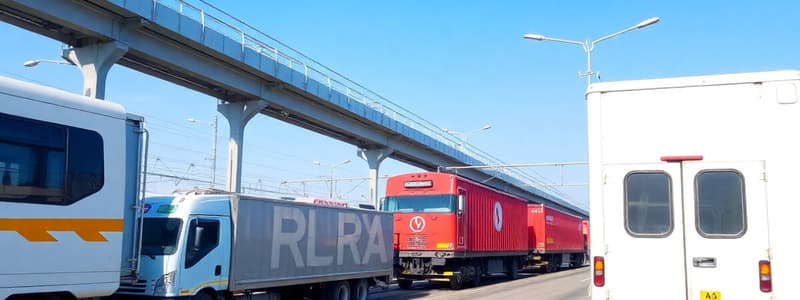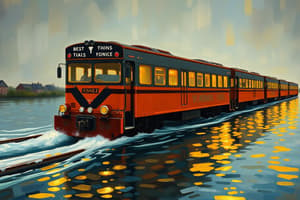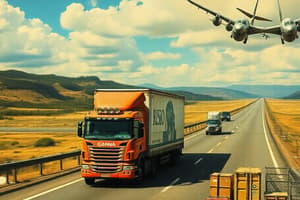Podcast
Questions and Answers
Which of the following is classified as freight in the transportation system?
Which of the following is classified as freight in the transportation system?
- Services providing transportation
- Guide-ways for transport
- Goods or items being transported (correct)
- People being transported
What is a major reason for the limited success in developing transportation planning systems?
What is a major reason for the limited success in developing transportation planning systems?
- Excessive reliance on public transportation
- Inadequate funding for infrastructure
- Lack of advanced technology
- Disregard for impacts on other transportation modes (correct)
Which of the following factors is not directly influencing the transportation system?
Which of the following factors is not directly influencing the transportation system?
- Supply and demand
- Transportation technology
- Environmental impacts
- Population growth (correct)
When is air transportation typically selected over other modes?
When is air transportation typically selected over other modes?
What are the two main types of traffic in the transportation system?
What are the two main types of traffic in the transportation system?
In developing transportation systems, what often shapes the system rather than the system developing itself?
In developing transportation systems, what often shapes the system rather than the system developing itself?
Which inherent advantage is typically associated with automobiles as a mode of transportation?
Which inherent advantage is typically associated with automobiles as a mode of transportation?
What aspect does not typically affect the decision in selecting transportation modes?
What aspect does not typically affect the decision in selecting transportation modes?
What is the total cost incurred for traveling by air, factoring in travel time?
What is the total cost incurred for traveling by air, factoring in travel time?
Which mode of transportation is considered the most flexible for delivery according to the information provided?
Which mode of transportation is considered the most flexible for delivery according to the information provided?
How much is the traveler willing to pay for each hour of travel time reduced?
How much is the traveler willing to pay for each hour of travel time reduced?
Which transport option incurs the least total cost after considering the travel time?
Which transport option incurs the least total cost after considering the travel time?
Which transportation mode typically requires additional truck transportation to deliver goods to their final destination?
Which transportation mode typically requires additional truck transportation to deliver goods to their final destination?
What factor might influence the traveler's final selection between the transportation modes, aside from cost and travel time?
What factor might influence the traveler's final selection between the transportation modes, aside from cost and travel time?
If the traveler decides to use the auto option, how long will the trip last according to the given information?
If the traveler decides to use the auto option, how long will the trip last according to the given information?
What is the primary disadvantage of waterways for shipping according to the information provided?
What is the primary disadvantage of waterways for shipping according to the information provided?
What is a key factor influencing a traveler's choice of transport mode when on-time arrival is a priority?
What is a key factor influencing a traveler's choice of transport mode when on-time arrival is a priority?
How can an increase in unemployment affect the demand for transportation?
How can an increase in unemployment affect the demand for transportation?
What occurs when the volume of transportation exceeds the equilibrium point?
What occurs when the volume of transportation exceeds the equilibrium point?
Which of the following is an example of how transportation technology has shifted equilibrium?
Which of the following is an example of how transportation technology has shifted equilibrium?
What is a direct consequence of transportation being a major user of energy?
What is a direct consequence of transportation being a major user of energy?
What would likely happen if a new transport mode is introduced that is significantly less costly than existing options?
What would likely happen if a new transport mode is introduced that is significantly less costly than existing options?
How does traffic congestion affect travel costs?
How does traffic congestion affect travel costs?
Which of the following describes a situation that would increase transportation demand?
Which of the following describes a situation that would increase transportation demand?
What is the main concern related to highway transportation?
What is the main concern related to highway transportation?
What is one of the objectives of transport policy and regulation?
What is one of the objectives of transport policy and regulation?
Which mode of transport is characterized by fixed routes and designated networks?
Which mode of transport is characterized by fixed routes and designated networks?
What best defines paratransit services?
What best defines paratransit services?
Which category of transportation organization is responsible for monitoring transport companies?
Which category of transportation organization is responsible for monitoring transport companies?
What is a major negative impact of unrestricted competition in transportation?
What is a major negative impact of unrestricted competition in transportation?
Which of the following is an example of ridesharing?
Which of the following is an example of ridesharing?
What is the primary role of Federal Agencies in transportation?
What is the primary role of Federal Agencies in transportation?
Which of the following is NOT an independent variable in trip generation methods?
Which of the following is NOT an independent variable in trip generation methods?
What is the primary purpose of trip generation?
What is the primary purpose of trip generation?
Which sub-model in the cross-classification method links household income to auto ownership?
Which sub-model in the cross-classification method links household income to auto ownership?
What is the first step in the cross-classification procedure?
What is the first step in the cross-classification procedure?
How does the trip purpose sub-model function within the cross-classification method?
How does the trip purpose sub-model function within the cross-classification method?
Which of these methods does NOT use mathematical analysis for trip generation?
Which of these methods does NOT use mathematical analysis for trip generation?
What is the role of origin-destination travel surveys in the trip generation process?
What is the role of origin-destination travel surveys in the trip generation process?
In the context of estimating trips for a suburban zone, which aspect must be considered?
In the context of estimating trips for a suburban zone, which aspect must be considered?
Flashcards are hidden until you start studying
Study Notes
Transportation System
- Transportation systems encompass vehicles, guideways, terminal facilities, and control systems.
- They operate according to established procedures and schedules on land, water, and in the air.
- Transportation systems are a result of independent actions by private and public sectors, often driven by self-interest or public interest.
- Two types of traffic exist within transportation systems:
- Freight: goods or items being transported.
- Passenger: people or services being transported.
Developing a Transportation System
- Historically, attempts to develop comprehensive transport planning systems have faced challenges.
- Engineers and planners often failed to recognize the interdependencies between national, regional, and local transportation systems.
- Existing transportation systems have largely adapted to evolving land use patterns, rather than playing a proactive role in shaping them.
Factors Affecting Transportation Systems
- Mode Selection:
- Each transportation mode possesses inherent advantages in terms of cost, travel time, convenience, and flexibility, influencing choices based on specific trip characteristics.
- For example, automobiles offer reliability, comfort, flexibility, and widespread availability for personal transportation, while air travel is preferred for long distances and time-sensitive journeys.
- Supply and Demand:
- The state of the economy significantly influences transportation demand.
- High unemployment or fuel costs decrease transportation demand.
- Introduction of more cost-effective modes increases demand for that mode and diminishes demand for older, less economical options.
- Existing transportation facilities determine the supply of transportation services.
- Low bridge tolls with minimal congestion result in lower travel costs.
- Traffic congestion on highways increases travel costs and time due to increased fuel consumption and idling.
- The state of the economy significantly influences transportation demand.
- Technology:
- Technological advancements have profoundly impacted transportation equilibrium.
- Jet aircraft revolutionized air travel, significantly reducing travel times compared to passenger ships.
- High-speed rail lines, such as bullet trains, are becoming popular due to their speed, safety, and efficiency.
- Environmental Impact:
- Transportation is a significant energy consumer, burning a substantial portion of the world's petroleum.
- This contributes to air pollution, greenhouse gas emissions, and global warming.
- Government regulations and policies are implemented to control the negative environmental effects of transportation and encourage shifts from private to public transportation.
Transport Policy and Regulation
- Government policies and regulations play a crucial role in shaping transportation systems by addressing transportation challenges.
- Transportation policies aim to mitigate the monopolistic tendencies often observed in various transport modes.
- Unchecked competition can lead to market dominance by a single company, potentially resulting in monopolistic control.
Public Transportation
- A general term encompassing various transit services available in urban and rural areas, including:
- Mass Transit: fixed routes, published schedules, designated networks, and specified stops (e.g., buses, light rail).
- Paratransit: flexible and personalized services designed to replace fixed-route, fixed-schedule mass-transit lines (e.g., taxis, car rentals).
- Ridesharing: shared transportation with two or more people traveling together via prearrangement (e.g., Uber, Grab).
Transportation Organizations
- Seven key categories of organizations involved in transportation:
- Private Companies: available for hire (e.g., transport companies).
- Regulatory Agencies: monitor transport companies (e.g., LTFRB).
- Federal Agencies: national-level legislation (e.g., DOTr).
- State and Local Agencies and Authorities: planning, design, and construction (e.g., DPWH).
- Trade Associations: represent marketing and business interests (e.g., petroleum companies, automobile companies).
Trip Generation Analysis
- Three methods are employed to analyze and predict trip generation:
- Cross-classification
- Trip-rate analysis
- Multiple regression analysis
Cross-Classification
- A technique developed by the Federal Highway Administration (FHWA) to estimate home-based trip generation.
- Utilizes sub-models to relate household income, car ownership, trip production, and trip purpose to each other.
- These models are developed using travel surveys.
Cross-Classification Procedure
- Establish a relationship by tabulation between income category and household percentage.
- Establish a relationship by tabulation between income category and car ownership.
- Tabulate the number of trips per day based on car ownership and income category.
- Calculate the total number of trips per day generated in the zone.
- Calculate the total number of trips per day by purpose.
Studying That Suits You
Use AI to generate personalized quizzes and flashcards to suit your learning preferences.




